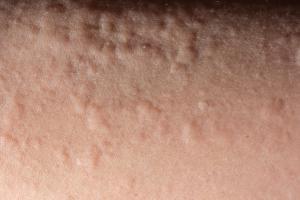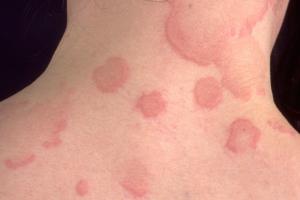Urticaria (hives)
Urticaria (hives) is a raised, itchy rash that appears on the skin. Children are often affected by the condition, as well as women aged 30 to 60, and people with a history of allergies. Hives rashes usually improve within a few minutes to a few days.
Types of urticaria
Urticaria may appear on one part of the body or be spread across large areas.
It can lead to a red, raised, itchy rash. The rash can be in one place or spread through the body. The raised areas on the skin are sometimes called hives or weals.


The raised areas can range from a few millimetres to the size of a hand.
Doctors may call urticaria either:
- acute urticaria – if the rash clears completely within six weeks (most cases last 24 to 48 hours)
- chronic urticaria – in rarer cases, where the rash persists or comes and goes for more than six weeks, often over many years
A much rarer type of urticaria, known as urticarial vasculitis, can cause blood vessels inside the skin to become inflamed.
In these cases, the raised areas or weals last longer than 24 hours, are more painful, and can leave a bruise.
When to seek medical advice
Urticaria on its own is not a serious condition. However, urticaria can occur in a severe allergic reaction called anaphylaxis.
If you have symptoms of anaphylaxis this is a medical emergency.
Call 999 immediately and ask for an ambulance if you, or someone else is experiencing anaphylaxis.
If you have urticaria, without the symptoms of anaphylaxis, visit your GP if your symptoms don't go away within 48 hours.
You should also contact your GP if your symptoms are:
- severe
- causing distress
- disrupting daily activities
- occurring alongside other symptoms
Causes of urticaria
Urticaria occurs when a trigger causes high levels of histamine and other chemical messengers to be released in the skin. This extra fluid in the tissues causes swelling and itchiness.
Histamine is released for many reasons, including:
- an allergic reaction, such as a food allergy or a reaction to an insect bite or sting
- cold or heat exposure
- infection, such as a cold
- certain medications – check the patient information leaflet with your medication to see if urticaria is a usual side effect, or if you need advice speak to your pharmacist or GP
In many cases of urticaria, no obvious cause can be found.
Some cases of long-term urticaria may be caused by the immune system mistakenly attacking healthy tissue. This can be difficult to treat and your GP may refer you to a specialist for tests and treatment.
Certain triggers may also make the symptoms worse. These include:
- drinking alcohol or caffeine
- emotional stress
- warm temperature
Diagnosing urticaria
Your GP will usually be able to diagnose urticaria by examining the rash. They may also ask questions to find out what triggered your symptoms. They may do some blood tests and may prescribe medication.
If your GP thinks that it's caused by an allergic reaction and the cause is difficult to identify, you may be referred to hospital for allergy testing.
If you've had urticaria most days for more than six weeks, or the treatment is not working, it's likely you will be referred to the hospital for further tests.
Finding out what is causing your rash may help you to avoid something you are reacting to, or help by treating the underlying cause.
Treating urticaria
Most cases of urticaria don't need treatment. This is because the symptoms are usually mild and often get better within a few days.
If the itchiness is causing you discomfort, antihistamines can help. Antihistamines are available over the counter at pharmacies.
Your pharmacist can give you advice about the best treatment to treat the rash.
Your GP may consider a short course of steroid tablets (oral corticosteroids) for more severe cases of urticaria. This treatment is not used routinely.
If you have persistent urticaria, you may be referred to a skin specialist (dermatologist).
Complications of urticaria
Around a quarter of people with acute urticaria and half of people with chronic urticaria also develop angioedema, which is a deeper swelling of tissues.
Chronic urticaria can also be upsetting and negatively impact a person's mood and quality of life.
Angioedema
Angioedema is swelling in the deeper layers of a person's skin. It's often severe and is caused by a build-up of fluid. The symptoms of angioedema can affect any part of the body, but usually affect the:
- eyes
- lips
- genitals
- hands
- feet
Medication such as antihistamines and short courses of oral corticosteroids (tablets) can be used to relieve the swelling.
Anaphylaxis (severe allergic reaction)
Urticaria can be one of the first symptoms of a severe allergic reaction known as anaphylaxis.
Other symptoms of anaphylaxis include:
- swollen eyes, lips, hands and feet
- feeling lightheaded or faint
- narrowing of the airways, which can cause wheezing and difficulty breathing
- abdominal pain, nausea and vomiting
- collapsing and becoming unconsciousness
Anaphylaxis should always be treated as a medical emergency.
More useful links
The information on this page has been adapted from original content from the NHS website.
For further information see terms and conditions.